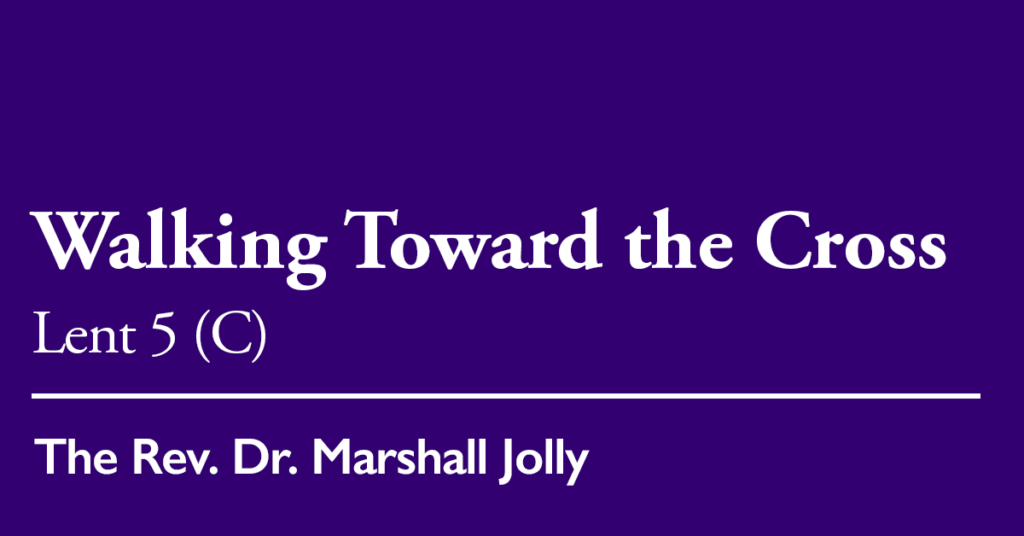Walking Toward the Cross, Lent 5 (C) – 2022
April 03, 2022
[RCL] Isaiah 43:16-21; Psalm 126; Philippians 3:4b-14; John 12:1-8

Despite the run-of-the-mill way that John narrates this dinner party with Jesus, there is a kind of shocking absurdity to it all. Taken together with the preceding chapter, the scene unfolds like this: Word reaches Jesus that his beloved friend Lazarus is gravely ill. He sets out for Bethany, but he doesn’t make it in time. Lazarus is dead—and not just recently dead; John goes out of his way to make the point. The King James Version renders it most striking of all: “Lord, by this time he stinketh: for he hath been dead four days,” Martha, Lazarus’s sister, tells Jesus.
Jesus, however, is undeterred. He cries out, “Lazarus, come out!” and Lazarus the dead man walks out of his own tomb, alive. And now, that same man, the recently-deceased Lazarus of Bethany, sits down to dinner with Jesus. One can’t help but imagine what the conversation must have been like. “So! Lazarus! Been on any interesting trips lately?”
Just offstage, John lets his readers in on a bit of dramatic irony. Between Jesus’ resuscitation of Lazarus and this odd dinner party, the chief priests and the Pharisees call a meeting of the council. Jesus has been performing increasingly worrisome signs, and now there’s talk that he’s raising people from the dead. And so, a plan is hatched to have Jesus arrested and put to death.
We can almost feel the tension in the air as Jesus, Lazarus, Mary, Martha, and the others sit down to dinner. The cost of Lazarus’ new lease on life might very well be Jesus’ own life, and one dinner guest—Judas—was prepared to do everything in his power to make it so. Just then, Mary, who hung on Jesus’ every word, got up from the table, let down her hair, opened a jar of powerfully scented nard ointment, anointed Jesus’ feet, and began wiping them with her hair.
Although it is tempting to lose ourselves in a web of whys, examining all the reasons Mary’s action was scandalous—social conventions, disrupting the intimacy of the dinner, distracting from the return of Lazarus, quasi-sexual innuendo (seriously—Google “feet in the Hebrew Bible”)—staying with the story itself evokes a depth and meaning that is far more powerful.
Judas, with his gaze firmly fixed on the Almighty Dollar, sanctimoniously critiques Mary’s behavior on economic grounds. “Why was this perfume not sold for three hundred denarii and the money given to the poor?” In other words, Judas sees Jesus anointed and scoffs, “What a waste!”
Jesus then makes explicit what John the Gospel writer had already made implicit: the day was coming soon when he himself would be poured out as a costly and precious sacrifice for the life of the world. Jesus says, “You always have the poor with you, but you do not always have me.” Although we often hear those words with a degree of confusion, the dinner guests and Judas, in particular, would have known exactly what Jesus was up to. He was rebuking Judas’ facile protest by quoting Torah—Deuteronomy 15:11, to be exact.
“You always have the poor with you…” would have fallen on Jewish ears in the same way that “Do unto others…” falls on our own ears. “You always have the poor with you,” the commandment begins, and those who heard Jesus utter it could finish the verse for themselves: “Therefore I command you, ‘Open your hand to the poor and needy neighbor in your land.’” In other words, this is not a missed opportunity to serve the poor and needy; rather, this is a prime opportunity to be in communion and fellowship with the One whose days were numbered.
It is easy for those of us who know how the story ends to dismiss the fear and uncertainty of those who can see nothing other than the cross and hear nothing other than the approaching drumbeat of those who would shortly demand Barabbas. In the same way, our haste to prepare for the coming of Eastertide can short-circuit our ability to put one foot in front of the other and walk through the pain and the suffering and the agony of Holy Week.
Yes, Easter is coming, but it is not here yet—and it cannot be, because our Lord has yet to meet his fate, taking our place; his body has yet to be broken for us; his blood has yet to be shed for the life of the world. Our Lenten journey culminates at the foot of the cross. It is only by walking shoulder to shoulder with our companions on the way that this dusty and worn path can become for us nothing less than the way of life and peace. Amen.
Don’t forget to subscribe to the Sermons That Work podcast to hear this sermon and more on your favorite podcasting app! Recordings are released the Thursday before each liturgical date.
Receive Free Weekly Sermons That Work Resources!


